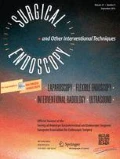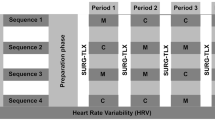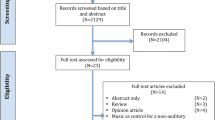Abstract
Background
Music and noise are frequent occurrences in the operating room. To date, the effects of these auditory conditions on the performance of laparoscopic surgery experts have not been evaluated.
Methods
Eight internationally recognized experts were recruited for a crossover study. The experts were randomized to perform three simple tasks on a laparoscopic simulator, SurgicalSIM VR. The tasks were equal in difficulty and performed under the following conditions: silence, dichaotic music (auditory stress), classical music (auditory relaxation), and mental loading (mental arithmetic tasks). Permutations of the conditions were created to account for a learning effect. The tasks were performed twice to test for memory consolidation and to accommodate baseline variability. Time until task completion and task accuracy via instrument tip trajectory (path of the tip through space) were recorded. Performance was correlated with responses on the Brief Musical Experience Questionnaire (MEQ).
Results
The study demonstrated that dichaotic music has a negative impact on time until task completion but not on task accuracy. In addition, memory consolidation of accuracy is negatively influenced. Classical music has a variable effect on experts’ time until task completion, yet all the experts performed the tasks more accurately. Classical music had no effect on recall of a procedure. Mental loading increased time until completion, but did not affect accuracy or recall. The experience of music varied among experts and influenced how each of the conditions affected their performance.
Conclusion
The study demonstrated that, contrary to common belief, proficiency in surgery does not protect against stressful auditory influences or the influence of mental preoccupation. Interestingly, relaxing auditory influences such as classical music can even have a positive impact on the accuracy of experts. Previous musical experience could help to identify surgeons whose performance may be specifically affected by music or noise.


Similar content being viewed by others
References
Sexton JB, Helmreich RL (2000) Analyzing cockpit communications: the links between language, performance, error, and workload. Hum Perform Extrem Environ 5:63–68
Sexton JB, Thomas EJ, Helmreich RL (2000) Error, stress, and teamwork in medicine and aviation: cross-sectional surveys (clinical research editorial). BMJ 320:745–749
Wallenius C, Larsson G, Johansson CR (2004) Military observers’ reactions and performance when facing danger. Military Psychol 16:211–229
Goodell KH, Cao CG, Schwaitzberg SD (2006) Effects of cognitive distraction on performance of laparoscopic surgical tasks. J Laparoendosc Adv Surg Tech 16:94–98
Bell AK, Zhou M, Schwaitzberg SD, Cao CG (2009) Using a dynamic training environment to acquire laparoscopic surgery skill. Surg Endosc 23(10):2356–2363
Shankar N, Malhotra KL, Ahuja S, Tandon OP (2001) Noise pollution: a study of noise levels in the operation theatres of a general hospital during various surgical procedures. J Indian Med Assoc 99:246–247
Hodge B, Thompson JF (1990) Noise pollution in the operating theatre. Lancet 335:891–894
Ray CD, Levinson R (1992) Noise pollution in the operating room: a hazard to surgeons, personnel, and patients. J Spinal Disord 5:485–488
Falk SA, Woods NF (1973) Hospital noise levels and potential health hazards. N Engl J Med 289:774–781
Moorthy K, Munz Y, Undre S, Darzi A (2004) Objective evaluation of the effect of noise on the performance of a complex laparoscopic task. Surgery 136:25–30 discussion 31
Moorthy K, Munz Y, Dosis A, Bann S, Darzi A (2003) The effect of stress-inducing conditions on the performance of a laparoscopic task. Surg Endosc 17:1481–1484
Allen K, Blascovich J (1994) Effects of music on cardiovascular reactivity among surgeons. JAMA 272:882–884
Carlson S, Rama P, Artchakov D, Linnankoski I (1997) Effects of music and white noise on working memory performance in monkeys. Neuroreport 8:2853–2856
Conrad C, Niess H, Jauch KW, Bruns CJ, Hartl WH, Welker L (2007) Overture for growth hormone: requiem for interleukin-6? Crit Care Med 35(12):2709–2713
Werner PD, Swope AJ, Heide FJ (2006) The music experience questionnaire: development and correlates. J Psychol 140:329–345
Disclosures
Claudius Conrad, Yusuf Konuk, Paul Werner, Caroline G. Cao, Andrew Warshaw, David Rattner, Daniel B. Jones, and Denise Gee have no conflicts of interest or financial ties to disclose.
Author information
Authors and Affiliations
Corresponding author
Rights and permissions
About this article
Cite this article
Conrad, C., Konuk, Y., Werner, P. et al. The effect of defined auditory conditions versus mental loading on the laparoscopic motor skill performance of experts. Surg Endosc 24, 1347–1352 (2010). https://doi.org/10.1007/s00464-009-0772-0
Received:
Accepted:
Published:
Issue Date:
DOI: https://doi.org/10.1007/s00464-009-0772-0




